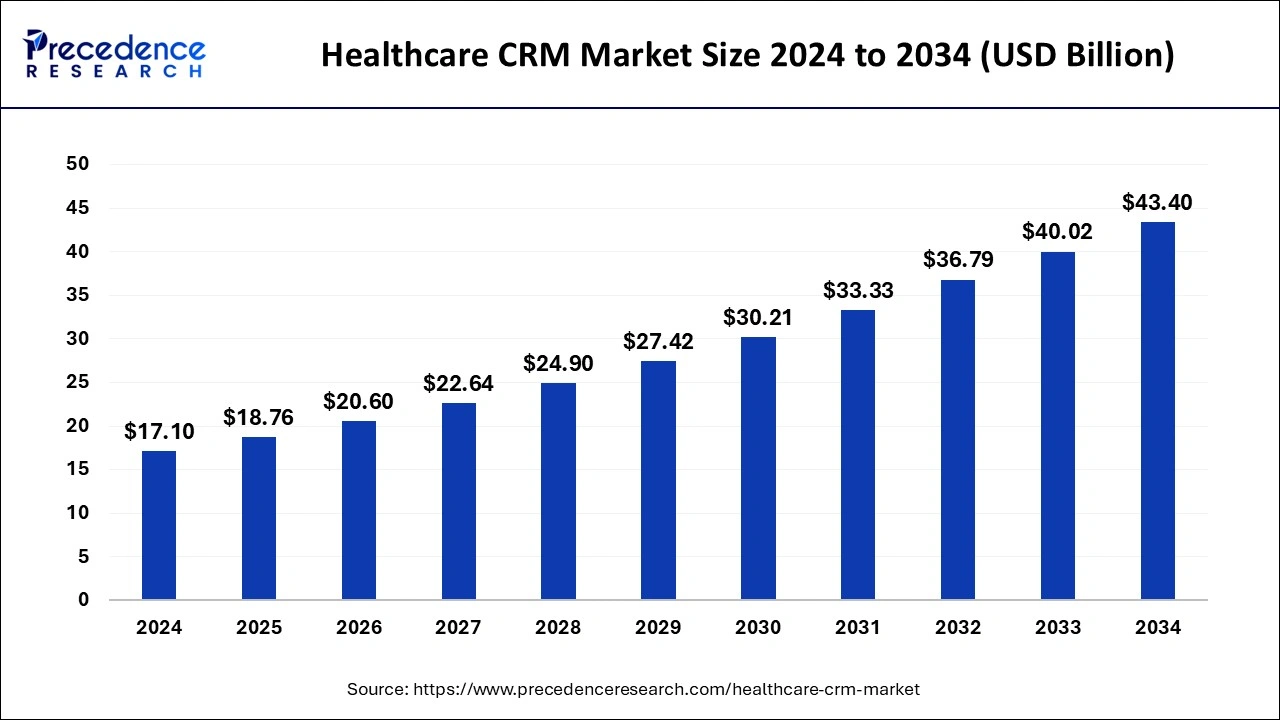Healthcare CRM Market Poised for Transformation Through 2034
The global healthcare CRM market size was calculated at USD 17.10 billion in 2024 and is estimated to hit around USD 43.40 billion by 2034, expanding at a CAGR of 9.76% from 2025 to 2034. The global healthcare CRM market is experiencing steady growth due to rising demand for personalized care, digital transformation, and advanced analytics.
What Opportunities and Trends Are Shaping Growth?
The Healthcare CRM arena is rapidly evolving through:
-
Surge in AI-powered personalization, enabling tailored care journeys
-
Shift toward virtual care models and remote engagement
-
Integration with telehealth, wearables, and EHR systems
-
Higher adoption in payer–provider partnerships and value-based care initiatives
Regional and Segment Insights
North America leads with over 50% of global revenue share, driven by advanced healthcare IT infrastructure and regulatory frameworks like HIPAA. The U.S. alone is expected to grow from USD 12.02 Bn in 2024 to USD 31.01 Bn by 2034 at a CAGR of 9.94%
Asia-Pacific is poised to be the fastest-growing region in the global healthcare CRM market, driven by rising investor interest and accelerated healthcare digitalization. Emerging economies such as India are witnessing a surge in hospital development, prompting a growing need for integrated IT systems like electronic health records and CRM software to streamline operations. This regional momentum is further reinforced by governments and private entities heavily investing in domestic healthcare infrastructure, creating fertile ground for CRM adoption. As healthcare becomes more transitional and technology-focused across these markets, the region is expected to attract substantial foreign investment and fuel long-term industry expansion.
Market Overview
Integration of Wearables and Demand for Patient-Centric Tools Drive CRM Adoption
The healthcare CRM market is evolving rapidly as providers embrace technology-driven care models and digital transformation. One of the most significant drivers is the integration of wearable devices with CRM platforms and electronic health records (EHRs), enabling real-time access to patient data and proactive clinical decision-making. These integrations enhance communication, streamline workflows, and allow for early interventions—ultimately improving patient outcomes.
Healthcare CRM systems now deliver a wide array of tools and services, including messaging, text alerts, comment forms, and automated email systems. These tools are widely adopted across hospitals, public clinics, private practices, and research institutions to optimize communication, reduce administrative burden, and minimize errors. Marketing automation, sales force management, and service automation are core functionalities driving efficiency and profitability.
The surge in remote patient monitoring, virtual care demand, and mobile health applications is further propelling CRM deployment. Patients increasingly seek accessible care options, and CRM platforms facilitate this through personalized engagement, home-based monitoring, and disease counseling.
Leading companies such as Salesforce, IBM, and SAP SE are expanding their service portfolios through partnerships and innovation. A notable example includes the 2018 partnership between IBM and Salesforce, which integrated IBM Cloud and Watson AI services with Salesforce Quip and Service Cloud Einstein to enhance customer coordination and intelligent service delivery.
Notably, the COVID-19 pandemic accelerated the adoption of healthcare CRM by highlighting the urgent need for agile, responsive, and integrated healthcare systems. Heightened awareness around health infrastructure has created lasting momentum for CRM platforms designed to meet both immediate and long-term patient care demands.
Market Scope
| Report Coverage | Details |
| Growth Rate from 2025 to 2034 | CAGR of 9.76% |
| Market Size in 2025 | USD 18.76 Billion |
| Market Size by 2034 | USD 43.40 Billion |
| Base Year | 2024 |
| Forecast Period | 2025 to 2034 |
| Segments Covered | Component, End Use, Deployment Model, and Application |
| Regions Covered | North America, Europe, Asia-Pacific, Latin America, and Middle East & Africa |
Key Market Developments
AI-Powered Virtual Assistants and System Integration Reshape Patient Engagement
- In January 2021, Nuance Communications, Inc. (NASDAQ: NUAN), a leading innovator in conversational AI, launched a groundbreaking AI-powered virtual assistant platform designed to enhance patient engagement and transform digital healthcare experiences across the care continuum.
Healthcare CRM Market Key Players
- Salesforce.Com Inc
- Microsoft Corporation
- Oracle Corporation
- PegasystemsInc
- Sage Group Plc
- SAP SE
- SugarCRM
- Zoho Corporation Pvt Ltd
- Cerner Corporation
- Keona Health
Segments Covered in the Report
By Component
- Software
- Services
By Application
- Customer Service & Support
- Marketing
- Sales
- CRM Analytics
- Others
By Type
- Operational
- Collaborative
- Analytical
By Deployment Model
- On-Premise
- Hybrid
- Cloud
By End User
- Healthcare Providers
- Hospitals
- Ambulatory Care Centers
- Diagnostics & Imaging Centers
- Pharmacies
- Others
- Healthcare Payers
- Private Payers
- Public Payers
By Geography
- North America
- Latin America
- Europe
- Asia-pacific
- Middle and East Africa
Go Through it – Medical Disposables Market
For inquiries regarding discounts, bulk purchases, or customization requests, please contact us at sales@precedenceresearch.com
- Bone Grafts and Substitutes Market Size to Surpass USD 5.68 Billion by 2034 - September 11, 2025
- Drug of Abuse Testing Market Size to Hit USD 23.05 Billion by 2034 - September 11, 2025
- CAR T-Cell Therapy Market Size to Reach USD 128.55 Bn by 2034 - September 11, 2025

